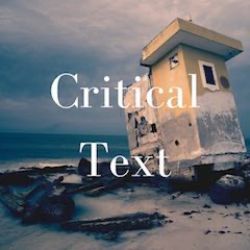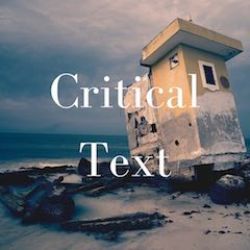This article provides some material regarding what theologians call "textual variants" in the Bible. This is a subject to which I've paid attention since the introduction of the NIV in 1978, and recently devoted over two years of intense study. Let me give an illustration on how this issue manifests itself. Recently, a friend of mine in S. California told me that his pastor, while preaching through the book of John and arriving at John chapter 8 —the account of the woman taken in adultery— firmly announced to his congregation that he wouldn't preach from it, "because he doesn't believe the account is part of the Bible". Rather alarming, to say the least.
It turns out that John 7:53 - 8:11 isn't the only passage in dispute. About 15% of the New Testament (NT) text (the size of 1st and 2nd Peter) consist of what modern-day theologians believe are discrepancies claimed to be mostly additions to the Greek text underlying the Bible. They believe this because in 1844, two (2) near-complete manuscripts discovered by Constantine von Tischendorf near Alexandria, Egypt, allegedly dated back to the 3rd century AD. The 23-year-old Tischendorf, considered a textual scholar, unilaterally claimed the manuscripts pre-dated the earliest copies of Greek manuscripts. (Papyrologists have since dated some crucial Byzantine texts back to 66 AD, so this point isn't valid as it once was, yet most scholars and translators are unaware of this. They're also unaware that Westscott and Hort never actually saw Tischendorf's discovered manuscripts - but I digress.)
By 1861, Westcott and Hort had used these texts to create and publish a brand new greek text which, they claimed, the church had not seen for at least 1,500 years. Called the "critical text", whose name is derived from the 'text-critical' manner Westscott and Hort used to determine what was the (allegedly) original scripture, it has become the basis for most modern translations, starting with the Revised Version (1863), and on through the NAS, RSV, NIV, NRSV and lately the ESV. These translations rely ever-increasingly upon these two Alexandrian texts, known as Aleph (Codex Sinaiticus) and B (Codex Vaticanus), both of which demonstrate excessive omissions. For instance, in Acts 8:37, the Ethiopian's confession before baptism is gone. So is half of Luke 4:4 - "man shall not live by bread alone" (leaving out "but by every word of God"). As a glaring example, Hebrews 9:15 to the end of the book is not in the Alexandrian text. The ESV sides with only one Alexandrian text 83% of the time, which is why you see so many translation footnotes and discrediting in-line text headers.
What most Christians don't know is what's required to accept the premise that certain portions of the Bible have become corrupted. You must believe that the church of God has used a corrupted Greek text, and that this corruption permeated the corresponding ancient Arabic, Syriac, Coptic, Latin, Armenian and English translations since the 4th century AD. This raises serious theological dilemmas; i.e. is God actually able to preserve His Word? Would God allow His church to limp along with a defective Greek text for 1,500 years before allowing 19th century "scholars" to fix it? If man can mess up the Word of God for so long, how do we know that there isn't some other old manuscript undiscovered in a cave that will prove other verses to be incorrect? Is the Bible actually reliable down to the word-level, as Jesus spoke about? Isn't inerrancy useless if we don't have preserved copies?
These same scholars tell us not to worry - no essential doctrine of the Christian faith is impacted by the omission of the textual variants. I couldn't find a hard-core analysis of this declaration, and none were offered by the proponents of the critical text. So I did some research, and wrote "Of Bible Translations and Manuscripts". My main point was to address two issues: (i) what is the level of the Bible's reliability, according to the Bible itself; and (ii) is it true that no doctrine is affected by these textual variants? (Short answers - down to the word level, and 31 doctrines are impacted ... and counting.) In addition, here is a simplified version that gets right to the point, using the ESV as the exemplar.
This is a vitally serious topic that has devastating consequences (Rev. 22:18-19).
Excellent Reading
Overview on the subject of "critical text onlyism". Web based, succinct.
Kent Brandenburg, editor, Thou Shalt Keep Them. Covers key aspects of Scripture's doctrine of bibliology. Seven sections covering passages on: divine preservation; availability; God's method of preservation; the reality of textual attack; examples of doctrine changed or perverted by text alterations; test of canonicity; and doctrine of preservation as it relates to separation.
Dr. David Sorenson, Neither Oldest Nor Best. Extraordinary analysis of recently unveiled 2009 copies of Sinaiticus and Alexandrinus, along with strong evidence indicating that Sinaiticus was written by Constantine Simonides. Very readable. Quotation of original sources. This book is a bombshell to the Critical Text camp.
Theodore P. Letis, The Ecclesiastical Text. If you are seminary trained, read this first. Traces the roots of today's critical text back to the German text critics, culminating in B.B. Warfield's compromises at Princeton -- the whole sad history of the church ceding textual authority to parachurch scholars. Amazingly penetrating insights into how God would preserve His Word through apographs (written copies), based on analysis of the Greek.
Floyd Nolen Jones, Which Version Is The Bible (or the free eBook version). Comprehensive and reachable by elders and lay alike.
Edward F. Hills, The King James Version Defended. A seminal book from a scholarly text critic and author well recognized and published in the field.
C. H. Pappas, ThM, In Defense of the Authenticity of 1 John 5:7, Second Edition. Sheds a strong light on the issues radiating from one controversial verse. Provides strong proofs base on external evidence, witnesses of the church, and the strongest case I've read of the internal witness.
David W. Daniels, Is The World's Oldest Bible A Fake? Provides little-known information about Sinaiticus, such as its missing contents, variable letter spacing, geography mistakes, use of Latin terms), and written testimony that lemon juice was used to age the parchment.
Mark Johansen, No Errors In My Bible, Sorry About Yours. Written by a software engineer in reachable prose with simple clarity.
A church in the Philippines has a course on Verbal Plenary Preservation.
Excellent Videos
Chris Pinto has not only debated Dr. James White on this topic, but has made some very reachable films -- for free on YouTube. The best ones are:
If any of the above links are broken, you can search YouTube for the title.
Dr. David Sorenson speaks about his book, "Neither Oldest Nor Best", at the King James Bible Research Council, here. A 45 minute clear presentation by this very affable man.
Bro. Vince put together three (3) animated powerpoint slide decks on this topic, showing doctrinal impacts, and narrated at a Bible study in 2017. You can find it here, under Study Series, entitled "ESV Corrupts Doctrine".
Excellent Viewing
See for yourself how Sinaiticus and Vaticanus appear highly suspect, using the guided tour under "You Be The Judge".
You must understand that this is a foundational issue. It doesn't get more basic than "what is the book of God" which has the very words of God.
The Textus-Receptus is the preserved copy of Word of God, and is canonical, being the very Word of God; whereas any translation based on the critical text is a counterfeit, only containing the Word of God.




